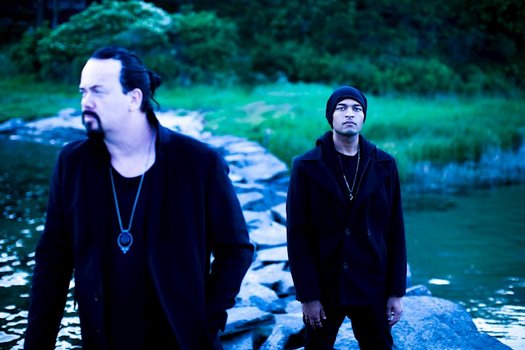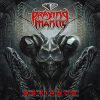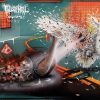Silent Skies – Hard Hitting Emotions
Sunday, 6th February 2022
Silent Skies, composed of Vikram Shankar and Tom Englund, released a beautiful album in the form of Satellites back in 2020. While not metallic in the least, focusing on gentle, melancholic piano and Tom’s emotionally gripping vocals, hit a sweet spot of emotional resonance. The band has now recently released their second album, Nectar, through Napalm Records (ORDER HERE). An effort that hits even harder than the debut, it’s poignant and gripping in all the right ways – something a metal fan can easily get behind despite it’s more quiet and reserved nature. We spoke with Shankar about the album, his start with piano and songwriting, emotional resonance, and even a bit of chat about video game composition versus metallic composition.
Dead Rhetoric: What inspired your love of piano and composition?
Vikram Shankar: Music in general. Specifically playing and writing piano kind of found me. It goes back to when I was four or five years old. My parents had a crappy little keyboard, it may have been a Casio, which is known for crappy keyboards but it’s unfair as they actually make some pretty good stuff! But we had this Casio, and I was sitting around and improvising and playing what I had heard on the radio. I had no idea as a five year old that improv was in any way extraordinary. But a family friend who played french horn in the Cleveland Orchestra had heard me and told my parents that it was a skill, and something that they should invest in for me. They signed me up for piano lessons and I studied theory and composition for ten years. Then I went to college, and I did more jazz piano and film composition.
I have a ton of nerdy academic background in how to play the right way and how to think about theory…all these things that don’t mean crap unless you have something to say with it. Thankfully, I am fortunate that I have something to say with it. It has been very important for me to write and compose, and even when I do piano covers or arrangements, I always view it as composing or recomposing a piece of music. To tie it to Silent Skies, it is probably why Tom [Englund] was so intrigued with me when he heard me play Evergrey music.
Dead Rhetoric: The two of you met through Redemption right?
Shankar: We actually met through Facebook. He saw a cover of an Evergrey song I did and reached out to me completely unprovoked. He told me, “I think we should make an album together.” How do you say no to that? You really can’t. That was way back in 2017, and he introduced me to Nick [van Dyk]. He told me he had just joined the band, which was at ProgPower 2017. That was when they did the announcement for Redemption playing in 2018. Told me that Nick was in the area and he wanted me to join the band too. So he set me up on blind date with him, and then the rest is history. But it all started with a Facebook message in 2017, which has shaped so much of my life since, which is a weird thought.
Dead Rhetoric: Yeah, that’s cool because that sort of thing could never happen if you go back in the past. There’s so much more networking now than there used to be.
Shankar: Yeah, people talk smack on Facebook, and for good reason. Social media is awful, but it has afforded me with so many wonderful connections to artists, fans, and friends that i really take seriously. If it was not for Mark Zuckerberg’s stupid thing, I wouldn’t have a career. That’s quite bizarre, because at the same time, I’m trying to stay away from Facebook as much as I can. But when the thing that you hate is what actually brings you your income, what are you going to do?
Dead Rhetoric: You released Satellites two years ago now. What did you want to do with Nectar as your second release?
Shankar: We had finished our first album in 2018, and it took two years to find the right label, formalize the deal, and release it. By the time it came out, it was old news to us. We were already itching to dive into the next frontier. We didn’t have any preconceived notions about it. Other than we knew ourselves a lot better and we didn’t have to figure out what it meant to be Silent Skies or learn each other’s languages either musically or linguistically. We knew what it was to work together and we had a foundation to build upon. We knew that it was going to be a lot more painless, and it was. What we didn’t anticipate was how the songs would have a very different identity. It’s subtle, because it still sounds like Silent Skies, but I think the songs are more potent. They have a lot more directness to them, and they hit harder. This is because we took the approach that we would make sure they hit hard and do what it takes for that to happen.
There were no artificial restrictions. There was no, ‘you can’t use an 808 in beautiful music,’ of course you can, so let’s do it. There was no, ‘you can’t use a ton of Moog synthesizer and have something be beautiful and tranquil, why not? Let’s do it.’ We did what the song needed. We took some weird chances that we wouldn’t have taken on the first album. You have that debut album thing where you are trying to figure yourself out and present yourself to the world in a way that is true to yourself, but hopefully palatable to people. So we didn’t care so much about that this time, we just wanted to make this album as good as we could. I think it paid off, because I think people are getting hit harder by it…at least so far.
Dead Rhetoric: When you say, ‘hit harder,’ do you mean like emotionally hitting harder?
Shankar: Yeah, it’s kind of like there is the lyrical aspect of the music, which has always hit hard because I don’t think Tom can write and execute lyrics that don’t hit hard. That’s probably his strongest point as a singer/songwriter. But I think that we decided that if a song had, for instance, had a certain amount of dark energy, and this dark energy was best served by something more propulsive and electronic, and that is what it would take for the song to be a more powerful experience for the listeners and ourselves making it, we didn’t hold ourselves back from doing it. I think it’s easy to over-self-edit, when you are working with something that’s within the confines of a stylistic box.
That’s such a curse of being in some genres that are very clearly defined. Making, for instance, power metal. There are certain stylistic tropes that fit within power metal. While it is possible to break out of these tropes and make something fresh, you risk making something that doesn’t feel like “true power metal.” In something like Silent Skies, we are kind of writing our book. We aren’t trying to make something that fits into a compartment that the average metal fan listens to, because chances are that they don’t listen to something that is piano and vocal driven. So we have some flexibility in writing our own rule book. In Nectar, I think we were a lot more comfortable writing that rule book than we were on the first album.
Dead Rhetoric: How important is that emotional response – are you aiming for that resonance that sits with the listener?
Shankar: On some level, every artist wants to make something that has an impact. But it’s a delicate thing. I feel like if the second you start to contrive that, and you start to say, “I’m going to write something with the exact purpose of eliciting X emotional reaction from the listener,” you lose a certain amount of organic authenticity. Which, ironically, is the quality that makes music hit hard. The vast majority of music that resonates with people does so because there is a certain amount of honest authenticity on the part of the artist that they put into the music that is perceived by the listener and they can in some intangible way tell that someone put their heart and soul into it. So I perceive that and I can see that the subject matter is really important to them. It becomes more important to you as you listen to it. I think listeners are smarter than they are given credit. I think that listeners can pick up on bullshit in a way that some people underestimate when they ‘sellout’ or whatever. They think that it will make them a fortune but it often turns out the opposite, because listeners can tell that there is some bullshit in there. Their engagement becomes more superficial.
People enjoy, or a lot of people, enjoy music that is in some degree, bullshit. But it tends to be a more superficial level of engagement. To get that maximum investment in a song, you have to be able to tell that it really meant something to the people who wrote it. So that’s all we do. We write brutally honest music and it has the fortunate result that it tends to impact people heavily as a result. But that’s something we are grateful for as the icing on the cake. It’s really about the process and being emotionally authentic through the whole thing.
Dead Rhetoric: You mentioned this a bit but obviously Silent Skies is not metal in the least. I would wager though, that a good chunk of the fanbase is from that genre, particularly with Tom’s work in Evergrey. What do you think it would take for music like this to get more attention outside of people drawn to it because of something else that you or Tom has done?
Shankar: I think that the door is open for a lot of other types of music fans to get into what we do. I think that maybe there is some kind of preconceived notion, especially with a guy who has made music with Evergrey for 25 years, that the music will have a feel that appeals to a certain type of music listener. But there is so much dark, melancholic music outside of metal that has its own fanbases. The average Adele fan is probably not going to get down to a classic Evergrey album, but there’s still so much beautiful, emotional, honest melancholy in what she does and so, it shows that there is room in the popular conscious for music that hits hard. It’s not that metal listeners are the only ones tapped into empathetic expressions of emotions. That’s far from the case. It’s just that there are these weird genre barriers that, I don’t know it they are self-erected, that metal fans like to keep an elite club around, or if it is external, and people look at metal artists with a certain gauge – I don’t know. But I know that it seems to me to be completely artificial and that beautifully authentic music has such a wide audience.
You find, in the world of film scoring, that people who wouldn’t get down with melancholic music in their free time absolutely love it when it is presented in the context of a film. So there are ways for this music to reach other people. So it’s a question of finding those avenues and winning the lottery. It’s so hard to find any fanbase in music [laughs], so we are grateful to have any fans, whether they are metal fans or pop or classical. We are happy that people just dig what we do.
Dead Rhetoric: There’s no box you are trying to fit in with Silent Skies. So to that end, what do you feel makes Silent Skies stand out, outside of that?
Shankar: I think that a big challenge of writing our first album was to figure that out. What it meant to write the kind of music that do? What makes it special? Why should people care? What are we presenting that is any way different from the stuff people already have to listen to? Part of it that has emerged, particularly over the course of making Nectar, is that I think the freedom that we feel to pull from really diverse influences and package it into this emotional, melancholic core. It’s something that I don’t know if too many artists meld these specific kinds of things together, and make things that your average metal fan might be into.
For instance, 808s and influences from classic Kanye West productions, or Aviicii inspired moments, or moments that were inspired by really ambient classical music or electronic soundscapes, and put them into a soundscape that metal fans resonate with because there is an emotional core. Metal fans are very good at finding emotional cores, because so much of what they listen to is emotionally based, even if that emotion is simply anger or chaos. Metal music is so emotional, so I think fans really connect with that. Metal fans can recognize that kinship, even if we are pulling from all of these influences too.
Dead Rhetoric: You are involved with a number of different bands that you are a part of, such as Redemption and Threads of Fate, as well as bands that are more solely your creation, like Lux Terminus or Our Destiny. What is your approach when writing music for a band, and how does that change based on who you are writing with?
Shankar: It’s a little bit of a tough thing, because it requires you to embrace a certain amount of creative ADHD, and you have to be able to write and follow a creative path in many weird directions while staying centered and not going completely crazy. Which is a very real possibility. Part of why I think it works for me is because everything I do feels very different. If I am writing an idea for Redemption, for instance, it’s probably not going to have much cross-pollination into the way that I view Silent Skies. Threads of Fate is its own beast entirely. That stuff I could never use anywhere else. That allows me to compartmentalize certain aspects of my creativity. I know that if I am writing something and it feels a certain way, then I know that it’s suited for a certain band. Like, it’s clearly a Silent Skies thing – it won’t fit into Redemption or certainly not fit in Threads of Fate. The danger comes when you have projects with overlap. Then it’s difficult to write for one thing and not another, or have them feed into each other in a way that dilutes the essence and value of each project. I am very fortunate that all the things I do are different enough that I don’t have that problem. I have also never only been able to create just one type of music.
I would go insane if I had one band and made one style of music for my whole life. I am envious of those who can do that. There are people I know who can write the same album for 30 years and are totally happy. That’s actually a beautiful thing. I don’t look down on that. They are confident in who they are and have a singular focus. They dive into it and it’s amazing. That’s great, but I can’t do that. I think I would be shutting off parts of my musicality if I only made music for, say Threads of Fate. I would be closing off parts of me that need to be expressed. If you close yourself off from what you need to be focusing on, then it becomes diluted. You start doing things within that project that maybe aren’t best for the project’s efficacy as a whole. I wonder, if I see bands throughout all of their career, if they start to make creative decisions that alienate a lot of fans and not in a good way, I wonder sometimes if it is because they couldn’t compartmentalize parts of themselves and everything got thrown into one blender. The result of blending those elements just isn’t as pleasing as if it would be if they could flourish in their own domain.
Dead Rhetoric: I saw that you also compose for Saber Interactive. What’s different about composing music for a video game than say, composing more metal based songs?
Shankar: On a practical level, it ends up not being terribly different. Something that Saber really loves from both Tom and myself, when we work on that sort of stuff, is that they love that we have a rock and metal background. If they just wanted something that was more stereotypically symphonic or a more hybrid-orchestral type of score, there are millions of people who can do that. But they like that we can inject some of that metal edge into it. Whether its the mentality or bringing in the seven string guitars and cranking the amps and really making something heavy. More and more, there has become a space for that in video game scoring. If you just look at Doom, that’s an amazing example of how really heavy metal music can fit perfectly in the context of some scores. For example, some of what Tom and I did for World War Z’s DLC was cut from the same cloth. It embraced heavy elements from d-tuned seven strings but it was packaged in a video game format. What’s different about that is that is is not a heart and soul project. I don’t mean we don’t invest in it, because we do. But when we write Silent Skies, we are directly drawn from our perspectives in the human experience – the shit we have gone through, the ups and downs…particularly the downs, inter/intra-personal conflict, depression, self-doubt, and all those things.
That’s not a part of video game scoring. It’s purely functional music. There is someone else’s vision – the creative design team and the office and all that. They have set the vision and we write music that will fulfill that vision. That amount of distance from it makes it a nice change of pace. It can be exhausting to pour every ounce of you into your music, and it’s a recipe for burnout. A great way to avoid that emotional burn out is to work on some things that you are allowed to have some distance. Instead of worrying about making this music that reflects your inner demons, we make music that sounds cool, or is a fitting soundtrack to killing zombies or something like that. It’s a really different mentality. Tom and I have the best time doing that. Though it seems like we do more of that than anything else now. These past few weeks, I have been doing 18 hour shifts trying to score for Saber. Where is that energy when we have to do Silent Skies?
Dead Rhetoric: That’s interesting, and goes back to having a sort of set limit when you are making a score. It is framed around a certain experience, as opposed to writing on your own, where there are no limits.
Shankar: But the thing is, I think it’s very valuable to have some sort of experimentation and we find other ways to stretch the limits when we do video game scores. There’s a lot of things I’ve tried to do in the context of scores that I have not been able to do in any other project. It would be too weird or too harsh and dissonant. We are trying to create a sound in a video game that is unlike anything we have done before, so we try all this wacky stuff and that is pushing yourself in a very different way. Maybe in a more intellectual way than emotional but still rewarding. We end up learning a lot of new tools and tricks that we haven’t done before. Maybe two albums down the road, we can try to bring something different in for our own music. It’s a learning experience.
Dead Rhetoric: I have had that conversation with a number of people over the years, that sometimes by having a limitation, it makes you be creative in different ways to avoid doing the same thing over again.
Shankar: Yeah, and with all of the different bands I do, some of the bands have more stylistic limitations, and it can be liberating in some ways to work within that framework. Redemption is very much like that. Redemption has been making music as a band for as long as I have been making music as a human being. They have a style that they can stretch, and we do stretch it on the album that I helped them write, which I think is coming out this year. But it’s still operating within a certain framework – that classic progressive sound. That’s nice, because I can’t have that framework when I work with certain projects as it would stifle them. But that is exactly what Redemption needs. There’s a place for everything.
Dead Rhetoric: Given your experiences working with different bands, is there someone in the metal community that would be a dream of yours to collaborate with?
Shankar: I have two answers, and this is excluding vocalists, because it’s very easy for me to pick singers…probably because I’m not an exceptional one myself. I love what they can present, and the way that the human voice is a direct link between the artist’s soul and the music they produce. The voice is a very personal instrument. Aside from them, I always go back to Devin Townsend. He has been a big inspiration to me in that he has been able to follow his own muse and not lose fans in the process…except for maybe some people who are stuck in the Strapping Young Lad phase, but aside from that, Devin can pretty much do whatever he wants and fans will come along for the ride. I love that, because I have always felt that I am an artist who feels that they can’t make just one type of music and be happy. To see someone else who has done the same thing is a great thing. He writes such vivid music, in any way it is – vivid, textually, or whatever, it is always vivid and shining with bright colors and I would love to be a part of it.
Also Mikael Akerfeldt. I think there’s something really special about that guy’s brain. He understands aesthetics better than most people in music. As much as people want to give him shit for doing what he has done, I love that man and what he has done in his bravery. It was so ballsy of him to abandon something that people loved so much. But he did it to be authentic, because he wouldn’t have been authentic if he didn’t do that. I respect the hell out of him for that.
Dead Rhetoric: What is planned for this year, either with Silent Skies or anything else you have going on?
Shankar: Silent Skies-wise, before we finished Nectar we were working on a third album. We are still working on it, and I suspect by the time that album is done we will be onto 4 and 5. We are perhaps, foolishly, ambitious. We all can’t sit still and we are always thinking about the next frontier. We are writing album three for sure this year. We have finished a few songs already and it’s quite fresh. I think it will take some people by surprise, and that’s what we are all about. Aside from that, I have a Threads of Fate coming in a few months and Redemption as well. I have transitioned my day job into more studio work – production and mixing, so I am busy with that. Basically, I can’t sleep! But that’s okay. To be challenged is to be fulfilled. I would much rather be doing this and trying to make the hectic chaos that is my musical life work, than be doing one thing and be completely unfulfilled in the process.


























